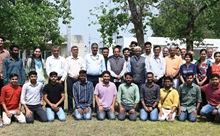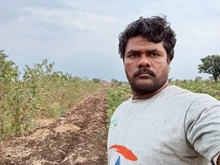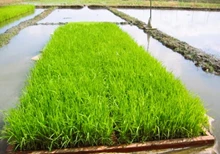The Tanzanian market is getting inflow of hybrid vegetable seeds from East west seed company & starting a new revolution in seed industry.

The East-West Seed brand has come to be known for quality seeds and innovation. It has offered good selections for a number of locally popular leafy vegetables, including amaranth, Ethiopian kale, and sukuma wiki. Product development is a continuing priority. Among the offerings that Tanzanian farmers can look forward to are: tomatoes with better tolerance to bacterial wilt and tomato yellow leaf curl virus; onions that are suitable for the hot, dry season with good storability; a slicer type cucumber with long shelf life; portable size watermelon; high yielding eggplant hybrids; and pumpkin varieties that can overcome production constraints faced by current varieties.
For related news: http://www.krishijagran.com/news
Tanzania, the largest country in East Africa, is home to the highest mountain, Kilimanjaro, and the deepest lake, Lake Tanganyika, in Africa. Its vast geographical area of 945,000 sq. kilometers is also home to thousands of smallholder farmers spread out across the country. There are about 3.7 million smallholdings, which make up for 80 percent of total farms Tanzanian farmers mostly depend on the rains for production. Improved farming techniques, market knowledge, and access to funds are often beyond the reach of many of them. In many places, farmers also lack access to quality seeds and inputs.
“Most of the farmers adopt farming techniques which they have learned from their parents. Though improved techniques are available, getting this knowledge to farmers remain complicated. Public extension is mostly not available nationwide, especially not in remote areas,” said Coen Everts, General Manager of East-West Seed in Tanzania.
He added, “Even if farmers have identified their preferred seeds, the physical supply or quality of the seeds available over time is not consistent. Most of farmers of Tanzania have little knowledge on the market for fresh produce, which results in all of them producing at the same time, therefore creating temporarily oversupply and low prices at time of harvest. Also finance institutes do not have a clear and accessible way to finance vegetable farmers. Terms and conditions for loan access is difficult for farmers to comply with.”
In this challenging landscape, vegetable company East-West Seed has set for itself a vision to lead the hybridization of Tanzania’s vegetable farming sector - and to become the undisputed market leader in Tanzania by 2020. How can this be made possible?
From small steps to great ambition
East-West Seed began with small steps in Tanzania, through a joint breeding project in 2008 called Afrisem. Ten years later, the company has now firmly established itself in the country. East-West Seed in Tanzania is a combination of two separate business units: a domestic marketing, sales and distribution business for vegetable seeds, and a production company for multiplication of marigold seed for export.

When asked about his ambitions for Tanzania, Mr Everts said: “We want to become the undisputed market leader in Tanzania in marketing innovative hybrid vegetable varieties by 2020. Secondly, we want to become the most efficient producer of marigold seed within the East-West Seed Group.”
Mr Everts stepped into the role in 2016, and has made plenty of learnings and discoveries about his market and customers. “The Tanzanian market is still very fragmented with about 30 vegetable seed companies all fighting for a piece of a USD 25 million annual market. It is my firm belief that within the next 3-5 years there will be considerable market consolidation, leaving maximum 5 players to divide the much increased hybrid market. Total market is expected to grow from 25 million to 65 million in the next 3-5 years, mainly due to value addition from hybrid varieties.”

To realize his ambitions in such a daunting market, Mr Everts knows that building networks is key.
“First on our agenda is partnering with farmers. We want to strengthen extension by involving farmers on the evaluation of our demo fields. This will help create awareness of our products as well as enhance farmer interaction. We also consider to partner with underutilized government extension workers to further strengthen our network,” he said.
“We are strengthening our network of trusted distributors in order to create nationwide coverage. We are also building a farmers database to inform them on our product availability and most recommended planting season. We are building stronger relationships with the fresh produce traders, inviting them to our demonstrations and field days to as integrate them in our network of farmers and enhance transparency in the marketplace.”
After making strides over the last ten years, we can only expect good things to come for East-West Seed in Tanzania: an innovative brand and a farmer-driven company, working steadily and progressively towards increasing the hybridization of the Tanzanian vegetable market.










